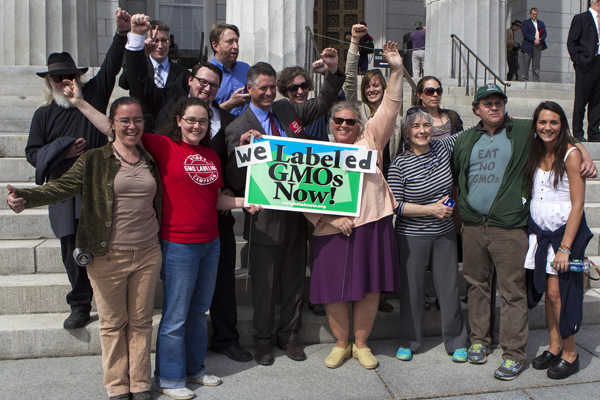30
Apr
Vermont Wins Legal Challenge to Its GE Labeling Law
(Beyond Pesticides, April 30, 2015) On Monday, a U.S. District Court Judge for the District of Vermont found that the state’s genetically engineered food (GE) labeling law, Act 120, is constitutional under the First Amendment, and thus rejected the motion to stop its implementation. The legal challenge was brought by the same industrial food companies —Grocery Manufacturers of America (GMA), Snack Food Association, International Dairy Foods Association, and National Association of Manufacturers — that had poured money into defeating the measure, before it overwhelmingly passed in the state legislature. The judge also dismissed a number of the plaintiffs’ claims, including assertions that the law violates the commerce clause and was expressly preempted by federal law. Read the full text of the decision here.
 Andrea Stander, executive director of Rural Vermont noted, “This decision by the federal court is a strong validation of the three long years that Vermonters worked tirelessly to pass the GMO Food Labeling Bill. We are one step closer to securing our right to know if GMOs are in our food.”
Andrea Stander, executive director of Rural Vermont noted, “This decision by the federal court is a strong validation of the three long years that Vermonters worked tirelessly to pass the GMO Food Labeling Bill. We are one step closer to securing our right to know if GMOs are in our food.”
Despite overwhelming support for the passage by the state legislature last year, Act 120, which was the first of its kind in the nation, was met with substantial but expected industrial backlash. The major trade association groups that were plaintiffs in this case announced their plans to file suit immediately after it was signed into law on May 8, 2014, stating that the labeling requirement would be “a costly and misguided measure.” However, analysis of published research negated this claim. Furthermore, genetically engineered foods are already required to be labeled in 64 foreign countries, including many where American food producers sell their wares. Fortunately, legislators anticipated that the major food companies would challenge the law in courts, and wrote in the creation of the Food Fight Fund, which allows individuals to donate to defend the law if it were to be challenged in court.
“As Attorney General Sorrell has said, Monday’s ruling upheld the heart and soul of Vermont’s GMO labeling law,” said Madison Monty of NOFA-VT. “The court’s findings have affirmed the solid legal standing of Act 120, and we are excited to have reached this important landmark on the road to the right to know.”
According to Vermont Right to Know, which is a collaborative project by Cedar Circle Farm, NOFA-VT, Rural Vermont, VPIRG, the next steps in the case may include proceeding to trial to resolve outstanding claims, or an appeal to the United States Court of Appeals for the Second Circuit. Though the court found that plaintiffs are not likely to succeed in blocking the GE disclosure requirement, the ruling indicated that the prohibition on using the word “natural” will face an uphill battle. The law is set to go into effect on July 1, 2016.
The court finding sets a precedent for other states that may want to move forward with labeling initiatives. Nearby states Maine and Connecticut have already passed legislation on GE labeling, however, these states currently contain a “trigger clause” that delays implementation until similar legislation is passed in neighboring states, including one bordering state in the case of Connecticut. Labeling laws were proposed and defeated in California, Oregon and Washington in recent years, after millions of dollars of corporate spending entered into the equation. Polls and surveys show overwhelming public support for labeling of genetically engineered foods, yet the same food and chemical companies continue to ignore consumers fight for the right to know every chance they get.
Beyond Pesticides believes that consumers have a right to know whether the foods they buy contain GE ingredients not only because of concerns over the safety of eating GE food, but also because of the direct and indirect effects of GE agriculture on the environment, wildlife, and human health. GE agriculture is associated with the increased use of herbicides —particularly glyphosate, the active ingredient in Roundup”” that crops are developed to tolerate. In light of the recent findings by International Agency for Research on Cancer’s (IARC) that glyphosate is a human carcinogen based upon laboratory animal test data, consumers have even more cause for concern about the health risks that these products pose.
Furthermore, there are many environmental consequences of reliance on chemical-intensive, genetically engineered agriculture. Repeated spraying of these herbicides destroys refuge areas for beneficial insects, such as the monarch butterfly, and leads to resistance in the very weed species that GE technology is intended to control. Yet, despite rampant glyphosate resistance and the presence of organic management practices that are more protective of human health and the environment, the agrichemical industry continues to resort to increasingly toxic combinations of chemicals. Recently, the U.S. Environmental Protection Agency (EPA) announced that it has registered Enlist Duo ®, officially approving the sale and use of a new wave of genetically-engineered (GE) 2,4-D tolerant crops and their accompanying herbicide formulations.
It’s important to note that currently the best way to avoid genetically engineered foods in the marketplace is to purchase foods that have the U.S. Department of Agriculture (USDA) certified organic seal. Under organic certification standards, genetically modified organisms and their byproducts are prohibited. To learn more about organic agriculture, visit Beyond Pesticides’ Organic Agriculture, and Eating With a Conscious pages. For more information on GE foods and labeling issues, see Beyond Pesticides’ Genetic Engineering website.
All unattributed positions and opinions in this piece are those of Beyond Pesticides.
Source: Vermont Right to Know GMO
Photo Source: Vermont Right To Know GMOs










